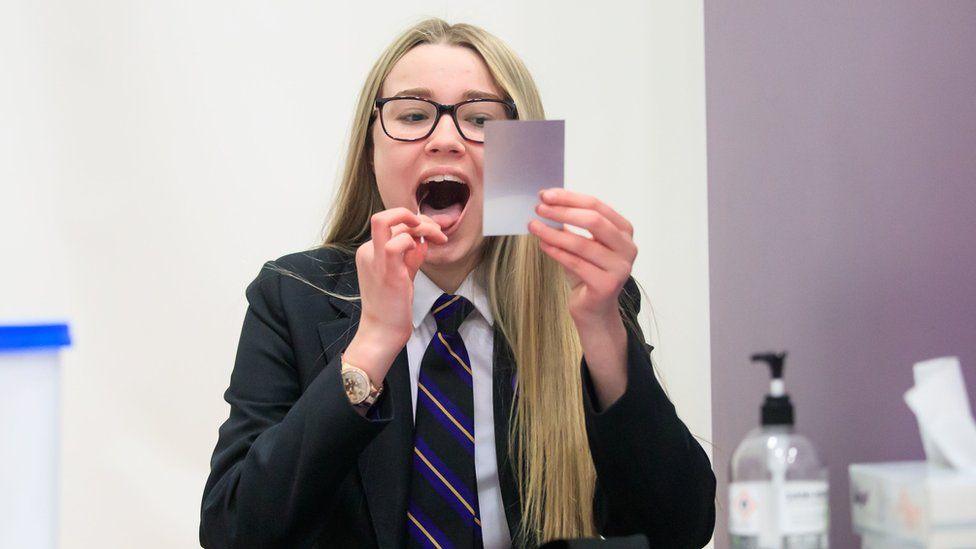Covid-19: Schools in England hit with pandemic-related absences
- Published
- comments
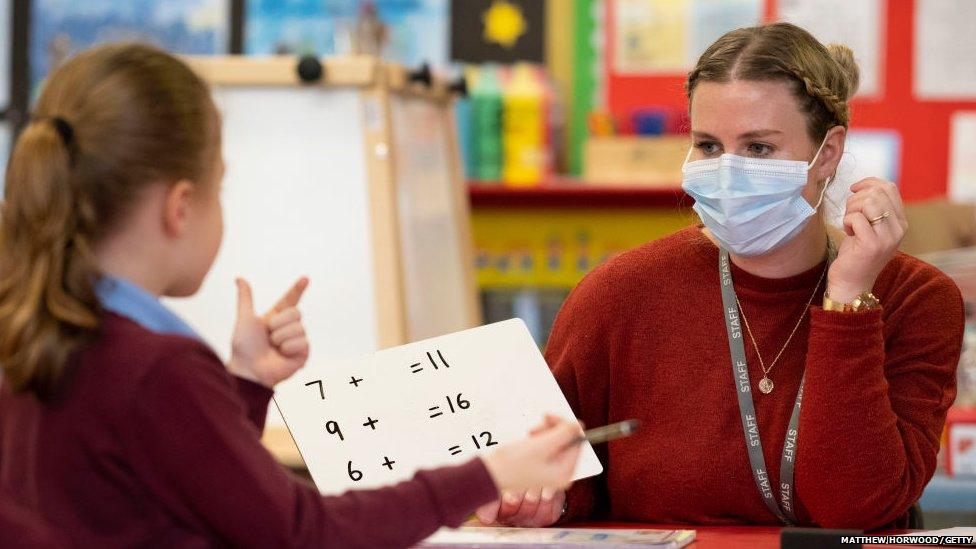
Schools around the UK are reporting that they're being hit with high levels of both staff and student absences in the first week back after the Christmas holidays.
A poll from one teaching union showed that schools in England are seeing lots of students and staff are not able to come into school for Covid-19 related reasons, either because they've tested positive or they have to isolate after being identified as a close contact.
Schools in Wales and Northern Ireland have said they're facing similar issues, and that it's causing huge disruption to pupil's learning.
Have lots of your friends been off due to Covid-19 in your first week back? Have you had to have lessons with other classes because teachers couldn't come in? Let us know in the comments below.
What did the poll say?
The school leader's union NAHT is an organisation that helps headteachers and schools with their concerns at work.
They did a snapshot poll of almost 2000 schools in England to see how absences were affecting them after the Christmas holidays.
In this survey, almost 580 schools said that 10% of their students were absent on the first-day of term because of covid-related reasons, and nearly 720 school heads said they had more than 10% of staff missing.
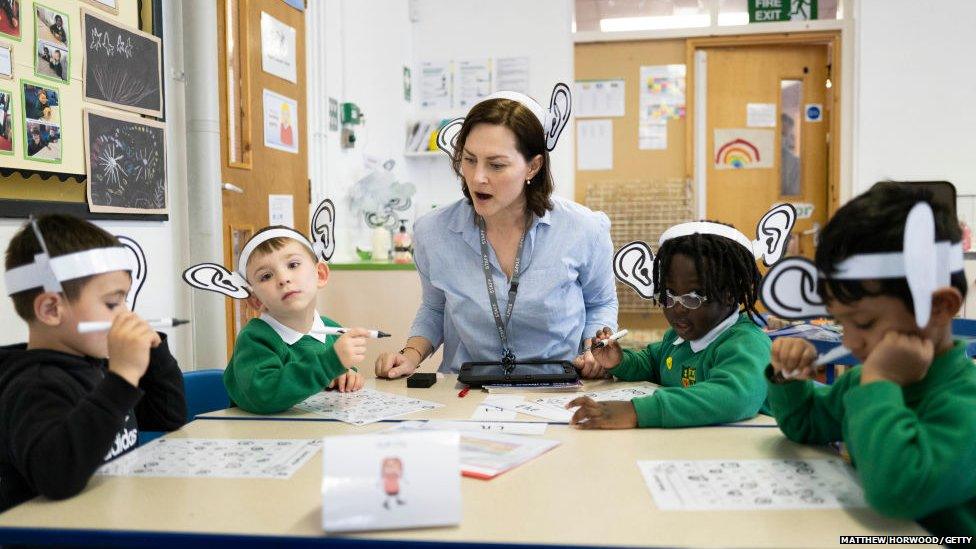
Paul Whiteman, the general secretary of the NAHT, said: "Given that this is a snapshot of just the first day of term, this is a very worrying picture. Infection rates - and therefore absence due to illness - could very likely rise as the term progresses, and already half of schools are having to turn to supply staff, with many finding they cannot secure suitable cover.
"Many schools are teetering on the edge and the next few weeks at least will undoubtedly continue to be an incredibly challenging time."
They also said that while they understand the government's desire to keep schools open, they will need "unflinching support" in order to achieve this."
How did the government respond?
The Department for Education in the English government replied by saying: "Schools across the country reopened this week and staff are working tirelessly to ensure classrooms are safe for face-to-face learning, and despite the challenges in this first week of term, millions of pupils have returned to be with their friends and teachers.
"We've supported schools to continue classroom learning for pupils through encouraging former teachers to step in and extending the Covid workforce fund for schools that are facing the greatest staffing and funding pressures.
"We've also asked schools to have contingency plans to maximise attendance and minimise disruption to learning, should they have high rates of staff absence, and are working with the sector to share case studies of flexible learning models to support the development of those plans."
What about elsewhere in the UK?
While the survey only covers England, schools in both Wales and Northern Ireland are facing similar problems, according to the Unions.
Laura Doel, director of NAHT Cymru in Wales, told Newsround that even though lots of schools in Wales haven't yet gone back for the spring term, they're already seeing a "huge number of staff absences [in schools] across Wales."
She said that student absences seem to be lower at this stage, but that schools are concerned by high levels of staff absences as it can disrupt pupil's learning.
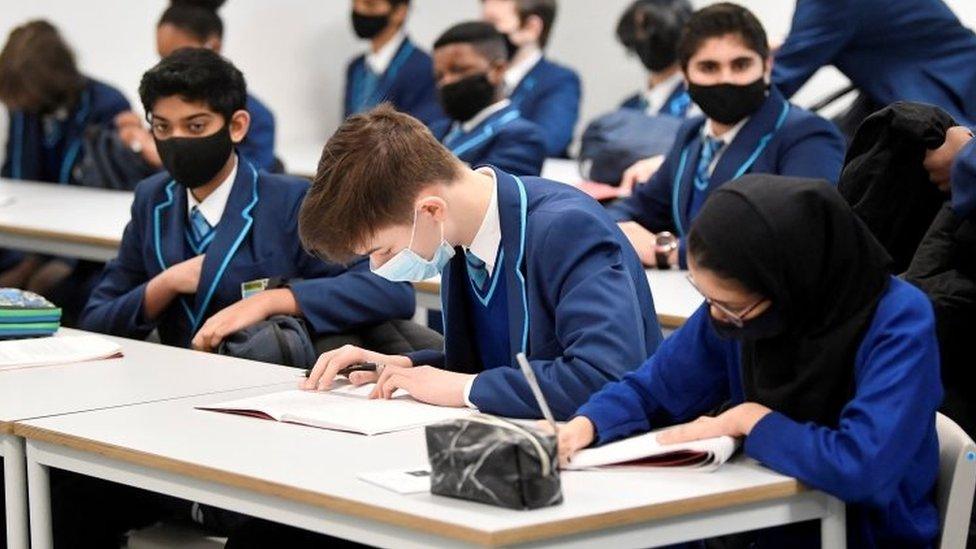
She continued that while the Welsh government are being largely supportive on issues such as providing more lateral flow tests for staff and students and letting schools stagger their return dates, they think that there was a missed opportunity in not prioritising teaching staff for booster jabs at the end of 2021.
The Welsh government said in response: ""We are following the advice of the Joint Committee on Vaccination and Immunisation. The JCVI has recommended the order in which people should be vaccinated in the UK. This ensures people who are at the highest risk from serious illness or death are vaccinated first.
"All eligible adults in Wales have been offered a booster vaccination."
They continued: "We are doing everything we can to protect schools from the impact of the Omicron variant and minimise disruption to learners. All staff and secondary age learners are now strongly encouraged to test three times a week, to help limit transmission of the virus and so that face-to-face learning in schools can continue.
"We are the only UK nation to have provided two planning days for schools at the start of the January term, to enable them to put extra safety measures in place and prepare for the return of pupils to schools."
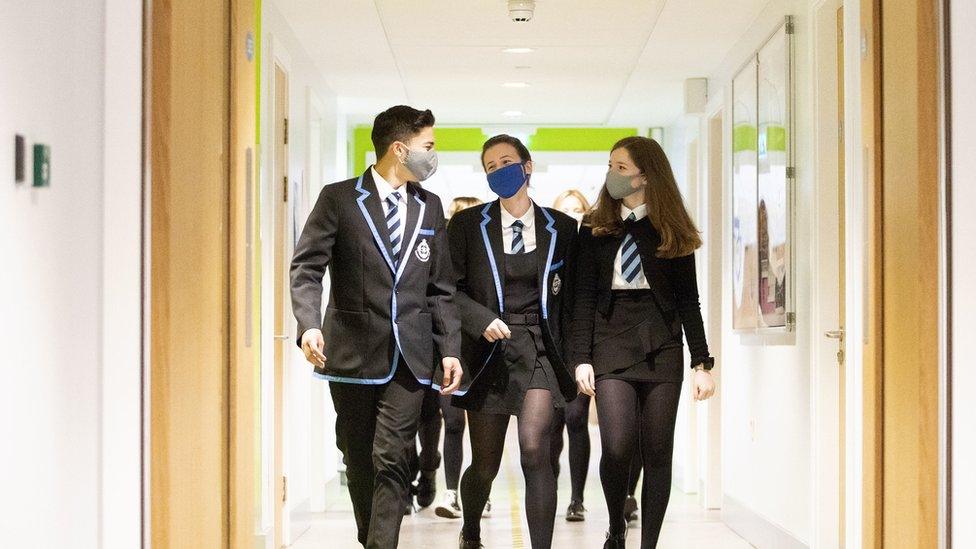
Northern Ireland NAHT Director Graham Gault said that they're also experiencing "extremely high" levels of absences in schools, and that the figures reported for England match the experience their members are reporting.
He described staffing absences as being at a "critical point" across the nation, adding that, in his view, it is "inevitable that every school in Northern Ireland will experience some level of disruption, where children have to move to remote learning for temporary periods of time until staffing levels can be resumed."
He also said of the Northern Irish government that their response to matters in education have frequently been "reactionary", "slow", and that "they've communicated often poorly".
In response, a spokesperson for the Northern Irish Department for Education said: "Our schools, like those across the rest of the UK and Ireland, are facing staffing shortages due to the pandemic. There is a limited supply of qualified teachers. We have made a formal call for retired teachers to provide support and we have also looked to provide more flexibility for schools in how they deploy substitute teachers. If further financial resources are needed by schools we will make bids to meet these costs.
"The Department has provided guidance on the use of remote learning should individual school circumstances mean it is necessary for short periods. During the pandemic, we have also paused school inspections; reduced school development planning requirements; suspended the need to carry out Key Stage Assessment; and reduced reporting requirements in order to reduce the administrative burden on our school leaders and staff.
"We cannot eradicate COVID at present but we are aiming to reduce the risk as much as possible in the school environment through a range of measures such as regular testing, good hand hygiene and natural ventilation, face coverings for post-primary pupils and consistent groups wherever possible. We have a shared objective to keep schools safe and open as we all know that the best place for our children and young people is in school."
There weren't any available figures from schools in Scotland but a Scottish Government spokesperson told us:
"Our priority is to keep schools safely open and to minimise further disruption to education. We know the next few weeks will be challenging for pupils, staff and parents and we are monitoring the situation very closely.
"Safety guidance for schools was strengthened in light of Omicron and updated to reflect changes to self-isolation requirements.
"We are working with local authorities to keep a close eye on staffing levels in schools and we will keep the need for any further measures under close review."
- Published7 January 2022

- Published6 April 2022
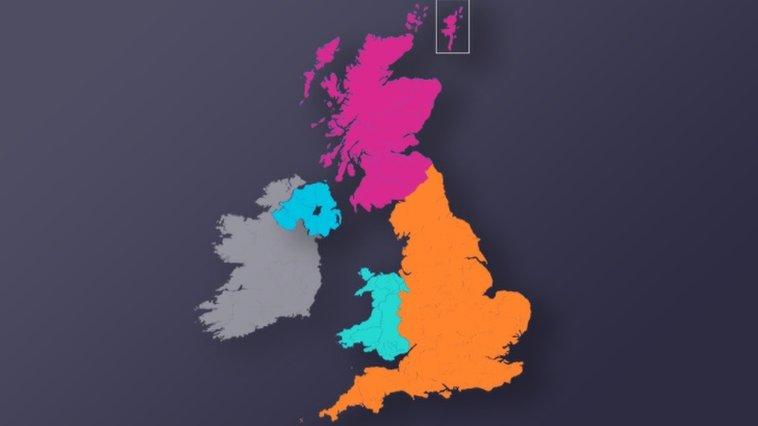
- Published3 January 2022
